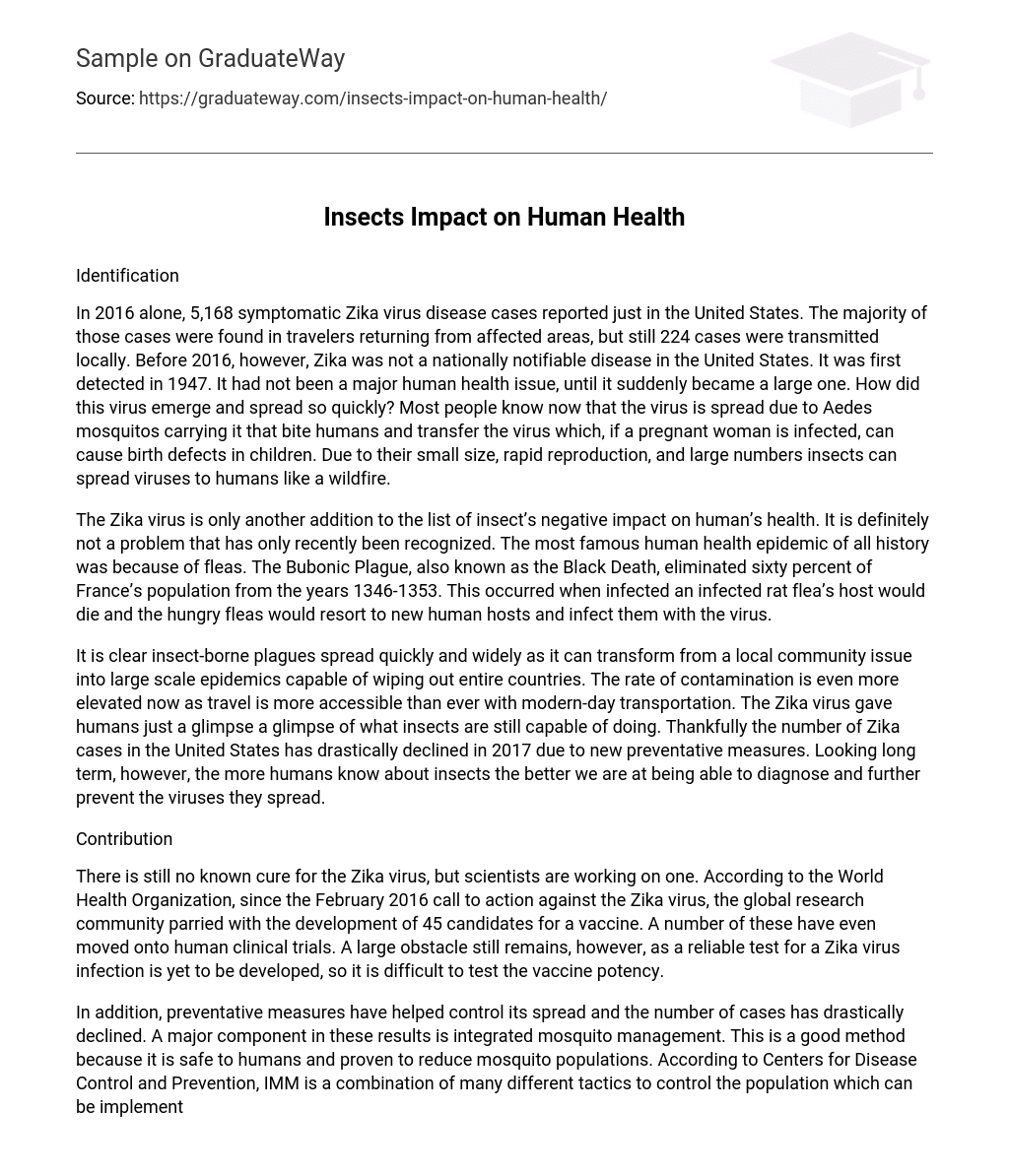Identification
In 2016 alone, 5,168 symptomatic Zika virus disease cases reported just in the United States. The majority of those cases were found in travelers returning from affected areas, but still 224 cases were transmitted locally. Before 2016, however, Zika was not a nationally notifiable disease in the United States. It was first detected in 1947. It had not been a major human health issue, until it suddenly became a large one. How did this virus emerge and spread so quickly? Most people know now that the virus is spread due to Aedes mosquitos carrying it that bite humans and transfer the virus which, if a pregnant woman is infected, can cause birth defects in children. Due to their small size, rapid reproduction, and large numbers insects can spread viruses to humans like a wildfire.
The Zika virus is only another addition to the list of insect’s negative impact on human’s health. It is definitely not a problem that has only recently been recognized. The most famous human health epidemic of all history was because of fleas. The Bubonic Plague, also known as the Black Death, eliminated sixty percent of France’s population from the years 1346-1353. This occurred when infected an infected rat flea’s host would die and the hungry fleas would resort to new human hosts and infect them with the virus.
It is clear insect-borne plagues spread quickly and widely as it can transform from a local community issue into large scale epidemics capable of wiping out entire countries. The rate of contamination is even more elevated now as travel is more accessible than ever with modern-day transportation. The Zika virus gave humans just a glimpse a glimpse of what insects are still capable of doing. Thankfully the number of Zika cases in the United States has drastically declined in 2017 due to new preventative measures. Looking long term, however, the more humans know about insects the better we are at being able to diagnose and further prevent the viruses they spread.
Contribution
There is still no known cure for the Zika virus, but scientists are working on one. According to the World Health Organization, since the February 2016 call to action against the Zika virus, the global research community parried with the development of 45 candidates for a vaccine. A number of these have even moved onto human clinical trials. A large obstacle still remains, however, as a reliable test for a Zika virus infection is yet to be developed, so it is difficult to test the vaccine potency.
In addition, preventative measures have helped control its spread and the number of cases has drastically declined. A major component in these results is integrated mosquito management. This is a good method because it is safe to humans and proven to reduce mosquito populations. According to Centers for Disease Control and Prevention, IMM is a combination of many different tactics to control the population which can be implemented by both professionals and the community. Some professional activities include conducting mosquito surveillance and tracking their populations, spraying insecticides, such as Bifen IT, using backpacks, truck and airplanes, and continuing studies to increase the effectiveness of these tactics. Member of the community help by removing places mosquitos can lay eggs, dumping standing water where larvae and pupae can live, and using insecticides inside and outside their homes.
Community members also help by staying informed about Zika and taking other preventative measures. Due to Zika’s asymptomatic nature and its ability to be passed through sex contact, condoms can help decrease the chances of it being spread amongst sexual partners. a person who has Zika to his or her sex partners. Another way the disease could spread is through blood donations. Presumptive viremic blood donor screenings are working to combat this by asking potential blood donors if they have recently travelled where virus infected mosquitos are present. In many countries, people are forbidden to donate blood for one month after they have visited an area where Zika is prevalent. These combined efforts are a a large reason why it is on a downward slope across the America’s.
Future Outlooks
On September 29, 2017 the Center for Disease Control deactivated their emergency response system for Zika which was activated in January 2016. The future of Zika is looking bright in the case of humans, but dim for the actual virus. With the measures stated above, the number of cases certainly took a hit, but it appears Zika is here to stay long-term. It will continue to be a human health threat in the United States and internationally due to travelers carrying it in and out of countries.
According to the North American Journal of Medical Sciences, The National Institute of Allergy and Infectious Diseases is currently attempting research with antiviral drugs working against Zika. They are using about the same principles as for West Nile virus and are working with a vaccine based on DNA with a live Zika strain. Also, the research on a genetically engineered vesicular stomatitis virus vaccine looks promising too.
The current management techniques of IMM may become obsolete in the future. Once they find a vaccine for Zika or an eco-friendly insecticide, then many of the tactics will no long be necessary. IMM requires a lot of effort and, though it does provide jobs and therefore is economically friendly, the level of effort required to be effective is not sustainable. In addition, insecticides include many non-target effects on humans. Many people are even reluctant to consume food that has been treated with pesticides due to its negative connotations. The best choice would be to continue with a combination of IMM and vaccine research until an effective vaccine is recognized, eliminating the virus and hopefully many others also.





